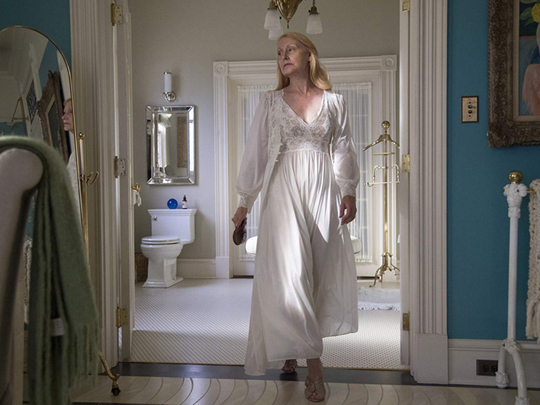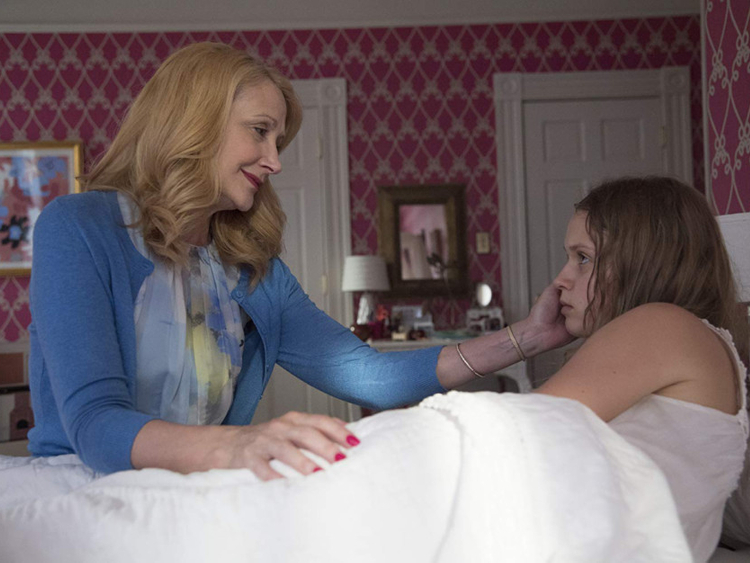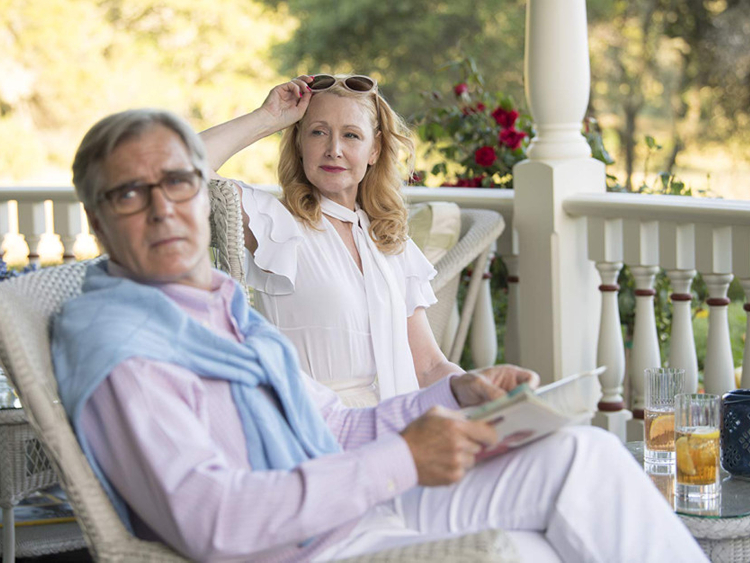
SPOILER ALERT: THIS INTERVIEW CONTAINS SPOILERS
Nobody loves you like your mother. By the end of Sharp Objects, the sinister HBO limited series, that old sentiment has been filtered through a very twisted algorithm.
Over eight episodes, Adora Crellin, the matriarch played by Patricia Clarkson, is revealed to be more than just the estranged parent of Camille Preaker (Amy Adams), a reporter who returns to her Missouri hometown to investigate the murders of teenage girls there. Clarkson chillingly navigates Adora’s conflicting sides: the grief-stricken mother of one dead child and another with a history of self-mutilation and alcoholism; the de facto ruler of a small town with a disturbing history; and, as it turns out, the woman suffering from a mental illness known as Munchausen by proxy, in which she makes a child sick to get attention from others and make the child dependent upon her.
Clarkson explained the challenges of playing a character with as many layers as Adora.
Was your impression of Adora different by the end of filming than it was when you saw her on paper?
I began with as much grace, and light, and fortitude, and righteousness as I could muster for her, because I think that was important for the character, for the writing, to do Gillian [Flynn, who wrote the novel the series was based on and is an executive producer] proud. I took this part because I knew I would end up in a very different place than I began. And I did.
I was in Los Angeles [on set] for five months, and maybe this says it all: I had chunks of time off, but I could never come back to New York as Adora. For some reason, I couldn’t be home in my New York apartment as Adora. Something took over me. I don’t want to sound like a ‘pretentious actor’, but this character infiltrated me in a way that was very hard — by Episode 5, I could not extricate myself from the sheer brutality, and yet sadness and excruciating pain, that I felt sometimes physically. I had to get those nails off, I had to realign myself. I had to shift my organs. [Laughs.] I had to just let go and come back to Patricia here in New York City, which is a different life than Adora in Wind Gap.
Had you had that experience with a character before?
I have at times, but they are few and far between. I’d say the last time it got like this — of course playing Blanche [DuBois, from A Streetcar Named Desire in 2004], because you never recover from playing Blanche. I don’t think it’s anything rare, or special; it’s just what happens in our lives as actors. But Adora, it was episodic, so scene to scene, episode to episode, storm clouds gathered. And I needed a poncho. [Laughs.]
As we get to know her, it becomes apparent that she’s really just an open wound - there’s so much trauma in her life. Which I can imagine is a difficult thing to embody for a long period of time.
It is. I’m fortunate to come from a very good family, very good parents, very middle-class, very All-American. I had unconditional love, which is something that I cannot imagine living without. So that’s where I began with Adora, a woman who I don’t think ever had true, real love, and who had this generational violence, and trauma, and abuse that has been with her for so long. It was literally breathtaking to play her. The air goes out of the room at times with Adora, and it has to. It becomes this claustrophobic, insular world where you think no one will escape.
The scene where she tells Camille she never loved her is one of the most devastating, because it’s also the nicest that Adora has been to Camille up until that point.
That is Adora. I think she is at times tone-deaf, and not feeling, lacking a true understanding of what genuine love is. She lacks genuine maternal instincts, because she was never given that. It’s a form of blunt-force trauma, when you’re abused as a child.
Do you think that Adora is aware that she actually killed Marian?
I’ve been asked this. That stays with me — it’s something I keep very private. I know what happened, I know what it is, but it’s just a private part of this character that I’ve never spoken about.
Even with Flynn and the creators?
I had a conversation with Gillian about it, and that was about it. We decided that it would be my decision.
Were you familiar with Munchausen by proxy before this experience?
Oh, I’ve been fascinated for a long time. I was well aware. I actually met with someone who had suffered from this.
A mother?
A person. There’s so much about it. There have been documentaries, books. It takes many shapes and forms, but in the end, it is ultimately about control and power. Adora is very private Munchausen’s, so she became almost a slightly different person. A character within a character. It’s becoming another person for a moment, and believing that you are doing good and doing right to induce your child to succumb to you. To need you, to love you, and the most important thing is complete dependence on you.
Those scenes in the last episode where she is poisoning Amma and Camille are nauseating to watch, because it’s a different Adora — a loving and tender version who is actually destroying these people.
That’s the only form of love she knows. Which is often with Munchausen by proxy, it’s their idea of true love. [Adora] is not one strand. When she shifts, when the illness takes over, she sees herself in a very specific light. It’s a desperate need, an almost obsessive need to take over this person’s life. And it was some of the toughest scenes I’ve ever played.
If you were doing that level of research, did you meet with any parents of children who self-mutilate?
Yes. This is difficult to talk about, because I don’t think it’s proper. Because again, it’s [mixing] a fact and a fiction. I did what I could — simple conversations. And Amy and I discussed it — her patterns, her thought process toward this particular illness.
Don’t miss it!
Sharp Objects streams in the UAE on osnplay.osn.com.















